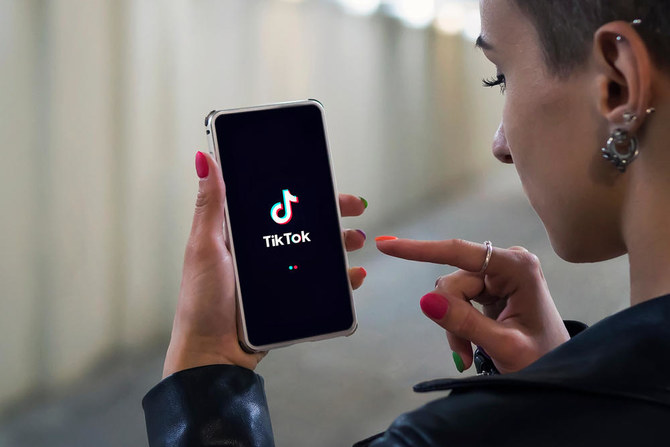PARIS: Rights activists on Tuesday accused social media giant TikTok of breaching EU laws by co-opting users into sharing their data for targeted advertising.
TikTok said it would change its policy next week to allow data to be gathered from over-18s in Europe whether or not they had consented, claiming the move was allowed under Europe’s data protection law (GDPR).
But digital rights group Access Now wrote to the company asking for clarity on the legal basis, calling it a “clear abuse” of several European laws including GDPR.
“TikTok wants to strip away the rights of people who use the platform to bump its ad revenue,” said Estelle Masse of Access Now.
Masse said other social media platforms also had problems with their consent mechanisms but TikTok was “taking a step further” by “effectively suggesting that we should not have a say in deciding how our information is used.”
Social media firms gather vast troves of data on individuals’ online habits and use it to sell highly targeted advertising.
But the GDPR forces firms to give detailed justifications for gathering data, something social media platforms have struggled to do.
TikTok has said its policy change relies on a principle in the GDPR called “legitimate interest,” which allows companies to process data without giving a specific justification.
However, regulators have already begun to limit the use of legitimate interest.
They ruled in February that websites relying on the principle to opt-in users to targeted advertising were acting illegally.
AFP has asked TikTok for a response to the criticism.
TikTok, whose parent company ByteDance is Chinese, is also under pressure from lawmakers in the United States over its use of data after reports suggested it allowed its staff in China to access data on US-based users.
The social media company confirmed the reports last week in a letter to US Congress but said it would never allow Communist Party officials to access data on US users.
TikTok ad policy is ‘clear abuse’ of EU law: activists
https://arab.news/5m6yu
TikTok ad policy is ‘clear abuse’ of EU law: activists

- Activists accuse TikTok of breaching EU laws by co-opting users into sharing their data for targeted advertising
Asharq Business with Bloomberg, Nasdaq to bring real-time US equities data to MENA

- Nasdaq to deliver exclusive real-time US equities market data
- Real-time updates fully integrated into Asharq Business’ data infrastructure and available across all platforms
RIYADH: Asharq Business with Bloomberg, the region’s leading business and financial news multi-platform channel, announced Tuesday a strategic three-year collaboration with Nasdaq, to deliver exclusive real-time US equities market data and updates to investors and decision-makers across the Middle East.
Through access to Nasdaq’s official data product, Nasdaq Last Sale (NLS), Asharq Business with Bloomberg will receive real-time last-sale trade updates and calculated insights across major US exchanges directly from the Nasdaq Market Center. The collaboration strengthens market transparency, enhances data-driven storytelling, and provides audiences and partners with deeper insight into global financial activity.
With a rapidly growing investor base in the region — and with Nasdaq serving as a primary destination for many Arab and regional investors — Asharq Business with Bloomberg reinforces its mission to deliver timely, accurate, and exclusive financial updates by integrating NLS data into its digital platforms, live markets coverage, and broader data ecosystem.
Leveraging its partnership with Bloomberg Media — which grants access to reporting from over 2,700 journalists and analysts worldwide — Asharq Business with Bloomberg continues to build on its reputation as the region’s most trusted and credible multi-platform business news source. The collaboration with Nasdaq underscores its commitment to providing reliable, data-backed content across social, digital, and streaming platforms, available for audiences anytime and anywhere.
Dr Nabeel Al Khatib, General Manager of Asharq News Network, commented: “It has been five years since the inception of Asharq Business with Bloomberg, and our audience has always been at the center of everything we do. We invest time and effort to understand what matters to them, ensuring we deliver data and stories that genuinely support informed decision-making. With growing regional interest in global markets, our collaboration with Nasdaq marks a strategic step toward offering a clearer, more comprehensive view of international financial activity. Through Nasdaq Last Sale, we aim to further empower our audience with transparent, real-time insights, strengthening their ability to navigate an increasingly interconnected global investment landscape.”
The Nasdaq leadership team added: “We are pleased to collaborate with Asharq Business with Bloomberg to broaden access to high-quality US market data in the Middle East. Through Nasdaq Last Sale, we aim to enhance transparency, support informed decision-making, and contribute to a more connected global investor community.”














